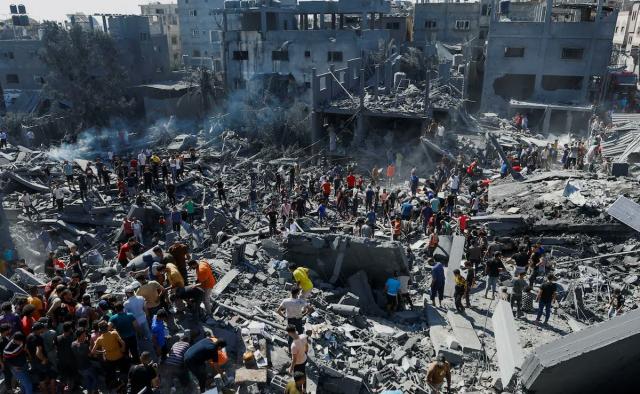As the 23rd day of war unfolds in Israel, the Israel Defense Forces (IDF) have intensified their ground operations within the Gaza Strip, pushing several kilometers deeper into the territory. Simultaneously, the Israeli Air Force continues its precision strikes on Hamas underground tunnels and specific high-value targets within the organization. Along the Lebanese border with Israel, tensions remain high, occasionally erupting into exchanges of gunfire. Meanwhile, Iranian proxy groups operating from Syria have initiated sporadic rocket attacks on Israel.
Last night, an IDF officer sustained serious injuries from a mortar bomb blast in northern Gaza, while another soldier was moderately injured during an encounter with terrorists within the Gaza Strip. The IDF spokesperson confirmed these incidents, adding that both casualties were promptly evacuated to a hospital for necessary medical treatment. In the past 24 hours, the IDF has executed strikes on over 450 military targets associated with the terrorist organization Hamas throughout the Gaza Strip. These targets include headquarters, observation posts, and anti-tank firing positions. As part of the ongoing expansion of ground operations, combined combat teams engaged terrorist squads attempting to attack IDF forces, thwarting potential anti-tank weapon attacks. Additionally, the IDF coordinated air support for ground-based targets.
A Palestinian scholar from the Al-Aqsa Mosque in Jerusalem sends a message to the “Queers for Palestine-crowd” in the West:
— Visegrád 24 (@visegrad24) October 28, 2023
“The people of Palestine will not allow a single homosexual in our land," such perversion brings the wrath of Allah”
🇵🇸🏳️🌈 pic.twitter.com/XFo8UGLUPp
Egyptian sources disclosed that they have issued stern warnings to the Israeli government, cautioning against full-scale military operations along the Philadelphia route, which separates the Gaza Strip from Egypt. Such operations would involve a comprehensive ground invasion of the Gaza Strip. Egypt's stance stems from concerns about the potential consequences of such an escalation, not only in terms of regional stability but also in light of the broader Palestinian and Arab reactions. Egypt has also rejected Israel's apology for an incident last week in which an Israeli guard tower near the border was fired upon. Cairo contends that the attack was not a mistake but a deliberate provocation designed to pressure Egypt into taking actions that could disrupt border crossing activities and fuel Palestinian and Arab discontent. Egyptian officials have emphasized their comprehension of these dynamics.
Hamas terrorists abduct a hostage and execute a wounded partygoer during their massacre in southern Israel.
— Israel War Room (@IsraelWarRoom) October 29, 2023
Israel will never forget the barbarism and cruelty of October 7. Its soldiers will fight until Hamas is eliminated and the hostages are free. pic.twitter.com/CRTKzAZJ6U
According to NetBlocks, an organization specializing in monitoring global internet connectivity disruptions, internet service in Gaza has slowly started to recover. The Gaza Strip witnessed a gradual decline in internet connectivity from the beginning of the conflict, culminating in a complete outage last Friday.
Residents of towns surrounding the Gaza Strip reported a relentless barrage of commotion and attacks, making it impossible to rest even for a moment. It appears that the IDF is utilizing the remaining time before a potential full-scale ground invasion to dismantle Hamas's capabilities, with a primary focus on neutralizing any threats that may obstruct Israeli ground forces.
If you're only tuning in now....hi.
— Israel Defense Forces (@IDF) October 28, 2023
This is a good opportunity to mention that we've said this countless times for over two weeks, including:
- Dropping paper pamphlets across Gaza
- Arabic social media
- International media
- Phone calls to residents of Gaza
- And more.
You… https://t.co/P9n2gfHr0v pic.twitter.com/AITI5rzUTy
The IDF has reaffirmed that there is no ongoing prisoner exchange negotiation, dismissing reports emanating from the Gaza Strip as mere "psychological terrorism." Brigadier General Daniel Hagari, the IDF spokesperson, urged the public not to lend credence to these rumors, emphasizing their purpose in manipulating the emotions of bereaved families and individuals with relatives held captive or abducted.


